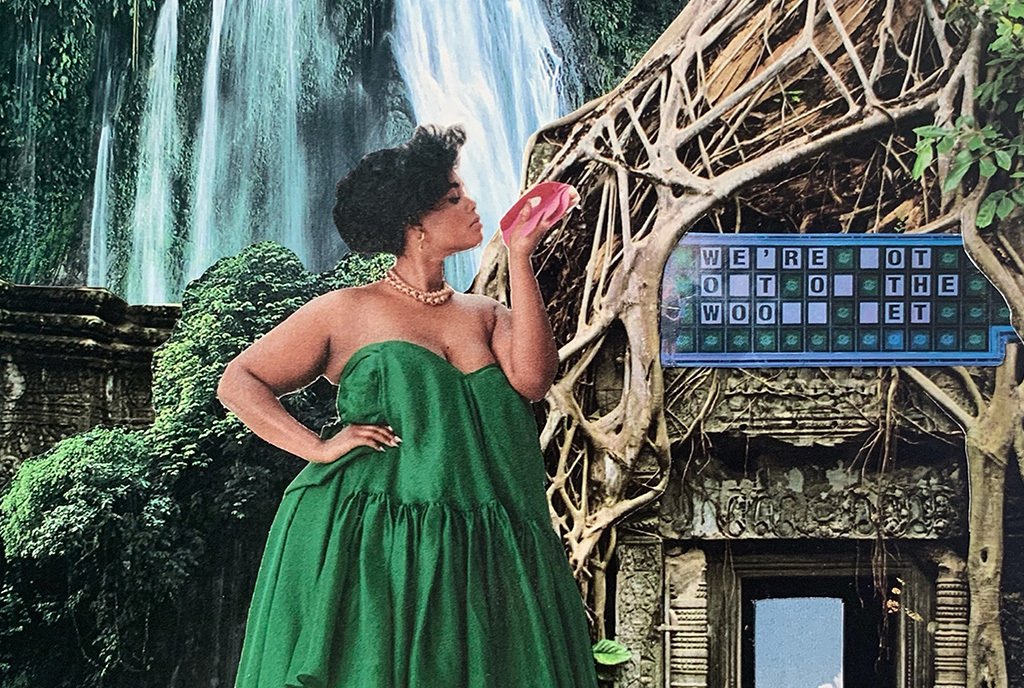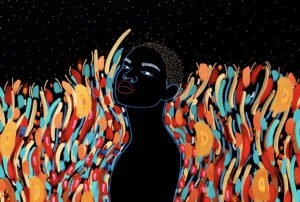
Editors’ note: This article is from Nonprofit Quarterly Magazine’s fall 2023 issue, “How Do We Create Home in the Future? Reshaping the Way We Live in the Midst of Climate Crisis.”
Since the reinvigoration of the #StopCopCity movement in January 2023,1 following the murder of a forest defender affectionately known as Tortuguita,2 Atlanta police and the local government have been adamant about depicting Defend the Atlanta Forest protesters and activists as “outside agitators.”3 There’s a history in that phrase. “Outside agitators” was often used as a bludgeon against many in the Civil Rights movement, including Dr. Martin Luther King Jr., and others who came up after him.
Contrary to the city’s “outside agitators” messaging, Atlanta natives and residents have long been fighting to protect themselves and the land from oppressive forces throughout—and long before the #StopCopCity movement. Natives of the city have gone through false promises of positive urban development4 —development that instead, in most cases, came at an unbearable cost. But in order to fully contextualize what it means to protect Atlanta’s natural habitat, we must first dive deep into Atlanta as a home to Black folks.
Atlanta has a moniker: “the city in a forest”5 —a phrase inspired by Atlanta’s lush, sprawling natural environment. At one point, Atlanta had one of the highest numbers of tree canopies of the major US cities.6 According to the Atlanta Journal-Constitution, the city has lost approximately half an acre of tree coverage every day for the last 15 years; since 2013, tree removal has outpaced tree planting.7
There’s another Georgia movement,8 one focused on the Okefenokee Swamp,9 which, according to H. D. Hunter, author and Black radical organizer with Endstate ATL10 —a grassroots political home with an abolitionist, Black, queer, feminist politic—is “considered one of the rarest swamps, rarest bodies of water in the world.”11 This rarity is due, in part, to the wildlife and the number of species native to the swamp itself. It is also the largest swamp in North America12 and is part of the original Muscogee lands. In the swamp, there are “over 850 plant species and 400 vertebrate animals,” Hunter told me. Organizers and activists say the swamp must be saved because it is “one of the last self-contained, naturally functioning wetlands left on Earth.”13
For organizers like Hunter, this city is home. Hunter holds memories of Atlanta—of what was, what is, and what we have to lose.
“I was born and raised in Atlanta,” Hunter explained. “I had my first kiss here, my first fight here, and attended high school and college here.”
Hunter’s parents moved to Atlanta in the eighties, from Florida. “But even being raised as a Georgian, I remember my dad telling me, ‘You meet other Black people, and if they’re away from home, then you see what they need, you see how you can be of service to them. You help them get adjusted, and then you all walk in lockstep together toward whatever next success exists for people who look like you here.’”
The Factors That Changed Atlanta
“I’ve been able to watch the city change and grow in ways that are really cool, and I’ve seen parts of it crumble. I see home in the only way that you really can—which is with a lot of complexity through whatever challenges and struggles there are,” said Hunter.
Atlanta, known as a “Black Mecca,” is also number one in the United States in income inequality.Cop City arrives at a time of swift changes in Atlanta, and cannot be separated from the vision Atlanta elites have for the city.
The first is rapid gentrification, defined by National Geographic as “a process where wealthy…[people] begin to move into poor or working-class communities, often originally occupied by communities of color.”14 In Atlanta, many cite the 1996 Olympics as one of the main accelerants of these changes.15 In preparation, elites of Atlanta looked to transform the city into an international one. In response to worldwide competitions such as the Olympics and the World Cup, there’s a global history of residents suffering to produce a world stage—and what happened in Atlanta was no different. Eminent domain gobbled up many homes, exploited labor, and pushed the start of new jail construction and inflammatory policy–policing.16 Atlanta has been embattled in a yearslong struggle to close the jail17 that was built in preparation for the ’96 Olympics—Atlanta City Detention Center, which has continued to cage poor, Black Atlantans for decades since.
Such tenuous conditions have made life difficult for Atlanta’s long-term Black residents, many of whom have found refuge among trees and rail lines in the broader metro Atlanta area when possible.18 Due to increasing “urbanization” and development of luxury features that kicked into high gear for the Olympics, the cost of homes increased dramatically, while the wealth of most Black residents did not. Atlanta, known as a “Black Mecca,” is also number one in the United States in income inequality.19 At the very same time, in the late 1990s, urgent urban and suburban developments grew the city but led to sharp decreases in forest cover.20
With these changes, policing expanded.21 The cost of living,22 alongside gentrification, also brought tense racial and class dynamics. In 1990, Black people represented 67 percent of the city’s population; by 2022, Atlanta was no longer a majority-Black city, as this demographic fell to 48.2 percent.23
If you want to understand Atlanta’s tendency to remove trees, Black people’s homes, and wildlife in one fell swoop, look no further than the BeltLine.
Another aspect that contributed to the change is “the Atlanta Way,”24 which describes public–private partnerships that deliver on the needs of Atlantans. However, many residents—like Hunter—feel like community members lost more than they gained: “So many corporate interests have been invited in”—bringing jobs, which sounds good on the surface—“but we don’t often talk about the trade-off, especially from an environmental perspective.”
The reality is that corporations in the city spark deforestation25 —and because they are here for profit, they’re going to extract more than they give. Public–private partnerships also mean the city and residents become increasingly dependent on private interests that are not, in turn, directly accountable to community members. Many argue, therefore, that profit motives compromised the purported mission of such partnerships.26 In the shadows of these public–private deals are the concentrations of wealth along racial lines. Often, these partnerships gave White business owners power over meeting the needs of what was a majority-Black city.
Public–private deals paved the way for Cop City.
If you want to understand Atlanta’s tendency to remove trees, Black people’s homes, and wildlife in one fell swoop, look no further than the BeltLine—a series of connected, multiuse trails that circumvent the center of the city by connecting public parks, transit, and housing that was supposed to be affordable27 along a 22-mile railroad corridor. The project was originally designed by a student at Georgia Tech in 1999, and took 14 years to break ground, in 2013.28 The BeltLine is slated to be completed in 2030, and will eventually connect 45 neighborhoods. According to Hunter, if development trends continue, these 45 neighborhoods will look quite different from how they look today.
“It’s really just been a big commercialization project, in my opinion, for the city, for another disingenuous method of attracting people here,” said Hunter.
Sign up for our free newsletters
Subscribe to NPQ's newsletters to have our top stories delivered directly to your inbox.
By signing up, you agree to our privacy policy and terms of use, and to receive messages from NPQ and our partners.
Before the BeltLine, there were “houses, trees, other wildlife pushed out to make something that we were initially sold as something that helps bring people together and gives us accessibility,” Hunter continued.
These factors—privatization of public land and services, gentrification, and deforestation—changed Atlanta, and these changes (among others) created the entry point to the proposed Cop City,29 which was originally Indigenous Muscogee land. The project earned its name due to the goal of building a mock city on the compound so that the police could practice raids, bomb testing, and other urban warfare tactics. The amount of land leased to the Atlanta Police Foundation is 381 acres, and current plans released by the City of Atlanta and APF include deforestation and use of 85 acres of land for the compound itself 30 —though who’s to say whether that will be the only acreage they will ultimately use.
Atlanta: 2020 and Beyond
In 2020, Atlanta, along with the entire country, was shaken by uprisings against police violence and the institution of policing itself31 —and tensions have never quite settled since. While abolitionist organizers like me doubled down on mutual aid and beating back police propaganda about the very meaning of public safety, the cops have seen increased budgets, new jail facilities, and unconditional support from local politicians.
During that time, police and the city pushed the narrative of a crime wave. Pundits said that the crime wave was caused by “defunding” of the police, although police budgets had actually increased. According to the Atlanta Police Department‘s own data, major crime decreased from 2019 to 2020.32 In 2020 to 2021, the APD openly set goals to increase the “technological footprint in economically challenged areas,”33 despite Atlanta already being the most surveilled city per capita in America.34 The APD determined to increase its revenue to meet these goals through fines and forfeiture—meant to increase both the size of the police force and their pay. At a time when Atlanta’s residents had taken to the streets to collectively protest against and question the role of policing, city officials had chosen a side: that of the police. Then, in May 2021, and as the city budgets passed, the APD added a line in their FY22 objectives about initiating planning for a public safety training academy—which would be Cop City.35
“[Seventeen] hours of public comment,” overwhelmingly against the training facility, seemingly did not sway Atlanta city councilors in September 2021, when they approved the ground lease.36 Local elections in fall 2021 featured the inevitable “tough on crime” posturing, and led to the election, via runoff, of Mayor Andre Dickens in late November.37 Just a month later, the newly elected city council would overwhelmingly vote to approve the 300-plus-acres project plan, despite continued mounting opposition.38
But it wasn’t just elected officials who were inching this project forward—academia has had its hands in the training compound, too.39 The Atlanta Committee for Progress,40 a somewhat amorphous grouping of Atlanta’s institutional leaders, has been at the center of forces backing Cop City. The president of Emory University, Gregory Fenves, sits on the Atlanta Committee for Progress. Emory University and President Fenves, among other collegiate figures, have been targets of protests due to their role in the project.41 Institutional leaders from Emory, alongside leaders from Morehouse, Spelman, Georgia Tech, and Atlanta’s other major academic institutions, committed to policing the city of Atlanta as a part of their efforts to insulate their campuses from the broader Atlanta community—“advancing” Atlanta into the future—and thus have committed to Cop City. (Morehouse faculty, however, came out against Cop City in February 2023.42) This is far from unusual: academic institutions tend to expand the scope and reach of policing in their nested neighborhoods, and their involvement in Cop City is a clear continuation of this legacy.43
“There are just so many twists and turns in the Cop City story about how that land was apportioned to be used. There was a little window of time in there when that land was promised to be made into green space for people who live here,” Hugh recalled. Residents were blindsided by the proposal to turn the forest into a training facility for cops instead.
The one constant about deforestation in Atlanta is that it seems the city council has no limits to what it will approve. “If we allow the powers that be to extract all of the value out of this place, what will have been the point of us making our homes and making our lives here in the first place? And, moreover, what will stop them from doing the exact same thing when we find a new place?” asked Hunter.
Atlanta Fights Back
Hunter remains heartened by the Stop Cop City movement’s ability to transfer the local struggle into international solidarity. He says #StopCopCity will go down in history along with some of the greatest national struggles for freedom: “Defending the Forest and Stop Cop City will be one of those things. It will be one of the landmark movements.”
Groups like Black Alliance for Peace Atlanta Citywide Alliance,44 Community Movement Builders,45 and the In Defense of Black Lives ATL coalition46 have been adamant about centering the impacts of heightened policing on Atlanta’s Black population. IDBL ATL formed in 2020 as a coalition organizing around demands to defund the police and expand safety for Black people. CMB have for years done grassroots organizing based in, but not limited to, the Pittsburgh neighborhood—including housing justice, cop watches, rent relief, and grocery-delivery programs—all a part of their work toward liberation zones. BAP ATL, the most recent of these groups, is connected to the national Black Alliance for Peace, organizing Atlantans around antiwar and anti-imperialist principles, connecting domestic and international African struggles.47 These are just a few of the groups that have committed to a struggle for liberation of Black people in Atlanta, including freeing us from the threat of the Cop City project.
Housing Justice League is another organization that has been in this movement to stop displacement.48 With a third of the city’s general fund going to law enforcement rather than housing, it becomes clear where the city’s priorities lie. HJL has helped tenants to organize themselves, fought for establishment of community land trusts, and waged a campaign for rent control. On June 5, they showed up to a city council meeting to speak out against Cop City, where a proposal to provide cops with free and reduced-cost housing came before any plans for addressing the housing crisis.49 (In fact, Atlanta returned $10 million in federal funds designated for affordable housing, after failing to put forward a plan for its use.50) HJL is one of the few grassroots organizations in the city that picks up the slack of the city government.
For Hunter, protecting Atlanta’s home could look like the abolishment of policing and prisons51 and like Land Back.52 Advancing these changes takes on the everyday work of sharpening our principles and commitments: “It’s just tapping further into them, radicalizing ourselves more, and helping other people along their journeys.” The legacy of slavery and colonialism continues to manifest in the current realities of policing, mass incarceration, and current land use policy. Stealing what was originally Indigenous land from current Dekalb County residents to build a training facility for law enforcement—an institution that emerged from slave patrols—is in concert with city leadership.
And Land Back, a return of land to its original inhabitants, would begin to address the lasting destruction of settler colonialism.53 The two sociopolitical frameworks—Land Back and abolition of policing—represent a transformation that would bring liberation. At this point, liberation is the direct opposite of what Cop City represents, and it is something that city leadership could never fully support while wanting to maintain power.
“We have so much to learn. There are still Indigenous communities here in Georgia who have ancestral ties to this land that, frankly, the rest of us don’t have; who have traditions in this land; who have ways of knowing about it and ways of caring about it,” said Hunter.
***
Let’s stop Cop City; stop the removal and erasure of Indigenous and Black people from the lands they call home; stop the reckless destruction of the land and its inhabitants in the name of profit; stop policing and prisons as a part of an anti-Black domestic and global imperialist project. This city of beautiful Black people and culture used to be in a forest. Whether that becomes true again rests in our resolve, courage, and clarity in this struggle to #StopCopCity.
Notes
- “No Police Military Base in Weelaunee Forest,” Stop Cop City, accessed August 11, 2023, stopcop.city.
- Shoshana K. Goldberg, “Remembering Tortuguita, Indigenous queer and non-binary environmental activist and forest defender,” Human Rights Campaign, March 21, 2023, www.hrc.org/news/remembering-tortuguita-indigenous-queer-and-non-binary-environmental-activist-and-forest-defender.
- Benjamin Stumpf, “‘Outside Agitators’ from the Civil Rights Movement to Stop Copy City,” The Abusable Past, April 5, 2023, www.radicalhistoryreview.org/abusablepast/outside-agitators-from-the-civil-rights-movement-to-stop-cop-city. See also Rebekah Riess, Dakin Andone, and Nick Valencia, “23 face domestic terrorism charges after arrests in ‘Cop City’ protests at planned police training site in Atlanta,” CNN, March 8, 2023, www.cnn.com/2023/03/06/us/atlanta-cop-city-protests/index.html.
- Willoughby Mariano, Lindsey Conway, and Anastaciah Ondieki, “How the Atlanta Beltline broke its promise on affordable housing,” Atlanta Journal-Constitution, July 13, 2017, www.ajc.com/news/local/how-the-atlanta-beltline-broke-its-promise-affordable-housing/0VXnu1BlYC0IbA9U4u2CEM/.
- Craig Johnson, “Why Atlanta Is The ‘City In a Forest,’” Patch, December 27, 2016, patch.com/georgia/midtown/why-atlanta-city-forest.
- “Urban Tree Canopy Study,” Trees Atlanta, accessed September 9, 2023, www.treesatlanta.org/resources/urban-tree-canopy-study/. And see Drew Kann, “As Atlanta grows, its trademark tree canopy suffers,” Atlanta Journal-Constitution, January 20, 2023, www.ajc.com/news/as-atlanta-grows-its-trademark-tree-canopy-suffers/NM7Y6L3XUBDZTJYWPXHNIV5WC4/.
- Kann, “As Atlanta grows, its trademark tree canopy suffers.”
- “Protect the Okefenokee Swamp! The Okefenokee is Endangered,” Georgia River Network, accessed August 11, 2023, garivers.org/protectokefenokee/.
- Ellen Montgomery and Jennette Gayer, “5 reasons why a titanium mine near the Okefenokee Swamp is a terrible idea,” Environment America, March 21, 2023, environmentamerica.org/articles/5-reasons-why-a-titanium-mine-near-the-okefenokee-swamp-is-a-terrible-idea/.
- Endstate ATL, accessed August 11, 2023, www.endstateatl.org/.
- This and all other quotes attributed to Hugh “H. D.” Hunter are from an interview with the author on June 14, 2023.
- New Georgia Encyclopedia, s.v. “Natural History of the Okefenokee Swamp,” by Whit Gibbons, last modified December 1, 2020, www.georgiaencyclopedia.org/articles/geography-environment/natural-history-of-the-okefenokee-swamp/.
- “Protect the Okefenokee Swamp!”
- National Geographic, Encyclopedic Entry, s.v. “Gentrification,” accessed August 11, 2023, education.nationalgeographic.org/resource/gentrification/.
- Michael McDougall and MacIntosh Ross, “The Olympics is a disaster for people who live in host cities,” Washington Post, July 29, 2021, www.washingtonpost.com/outlook/2021/07/29/olympics-is-disaster-people-who-live-host-cities/.
- “Policy–policing” is used here to connote the continuum between policy and policing: policy begets policing and policing is an extension of policy.
- “When We Fight, We Win! Atlanta City Council Voted to Close the City Jail on May 20th, 2019.,” Close the Jail ATL, accessed August 11, 2023, www.closethejailatl.org/.
- Alex Whittler, “‘Black Mecca’ expanding to north Metro Atlanta suburbs,” FOX 5 Atlanta, February 23, 2023, www.fox5atlanta.com/news/metro-atlantas-black-meccas-suburban-layout-is-changing.
- Dylan Jackson, “Atlanta has the highest income inequality in the nation, Census data shows,” Atlanta Journal-Constitution, November 28, 2022, www.ajc.com/news/investigations/atlanta-has-the-highest-income-inequality-in-the-nation-census-data-shows/YJRZ6A4UGBFWTMYICTG2BCOUPU/.
- Matthew D. Miller, “The impacts of Atlanta’s urban sprawl on forest cover and fragmentation,” Applied Geography 34 (May 2012): 171–79.
- Thomas Wheatley, “Atlanta police want more cash and more officers,” Axios Atlanta, May 18, 2022, www.axios.com/local/atlanta/2022/05/18/atlanta-police-budget-2023.
- Jon Shirek, “‘It’s getting harder and harder out here’: Metro Atlanta’s high inflation rate not going away soon,” NBC, 11Alive, Atlanta, October 13, 2022, www.11alive.com/article/money/metro-atlanta-inflation/85-16b7f855-f1ea-4108-8388-4e6dcc33b371.
- “QuickFacts: Atlanta city, Georgia” United States Census Bureau, accessed August 27, 2023, www.census.gov/quickfacts/fact/table/atlantacitygeorgia/PST045222.
- “The Atlanta Way” is an ethos, mantra, and political commitment for people in Atlanta. See Kristal Dixon, “Is it time for a new Atlanta Way? Yes, ‘Cop City’ opponents say,” Axios Atlanta, June 16, 2023, www.axios.com/local/atlanta/2023/06/16/changing-atlanta-way; and Micah Herskind, “This is the Atlanta Way: A Primer on Cop City,” Scalawag, accessed August 11, 2023, scalawagmagazine.org/2023/05/cop-city-atlanta-history-timeline/.
- Kann, “As Atlanta grows, its trademark tree canopy suffers”; and Matt K. Smith, “Atlanta’s Building Boom Is Destroying Its Famous Forests,” Daily Beast, May 16, 2018, www.thedailybeast.com/atlantas-building-boom-is-destroying-its-famous-forests.
- The Investopedia team, “Public-Private Partnerships (PPPs): Definition, How They Work, and Examples,” Investopedia, last modified April 28, 2022, www.investopedia.com/terms/p/public-private-partnerships.asp.
- Adina Solomon, “Atlanta Scrambles to Fix the BeltLine’s Affordable Housing Failures,” Bloomberg, September 1, 2017, www.bloomberg.com/news/articles/2017-09-01/lessons-from-atlanta-beltline-s-housing-failures.
- Stacy Braukman, “The Man with a Plan,” December 12, 2019, news.gatech.edu/archive/features/man-plan.shtml.
- Herskind, “This is the Atlanta Way.”
- Aja Arnold, “Atlanta Poised to Approve Massive Police Training Facility Despite Public Opposition,” The Intercept, August 11, 2021, theintercept.com/2021/08/11/atlanta-police-training-center/; and George Chidi, “No One Believes in Cop City. So Why Did Atlanta’s City Council Fund It?,” The Intercept, June 6, 2023, theintercept.com/2023/06/06/cop-city-atlanta-funding-vote/.
- Richard Fausset and Michael Levenson, “Atlanta Protesters Clash With Police as Mayor Warns ‘You Are Disgracing Our City,’” New York Times, May 29, 2020, www.nytimes.com/2020/05/29/us/atlanta-protest-cnn-george-floyd.html.
- Emotionally intelligent papi (@julianakilrose), “i generally dont trust police reporting on ‘crime’…cause why would I?,” X, May 6, 2021, 3:43 p.m., twitter.com/julianakilrose/status/1390391904915927041?s=20.
- Emotionally intelligent papi (@julianakilrose), “apparently one of their goals for FY2022 is to ‘increase the dept’s technological footprint in economicallly challenged areas of the city,’” X, May 6, 2021, 3:49 p.m., twitter.com/julianakilrose/status/1390393339212668929?s=20.
- Lucas Ropek, “If You Live in One of These U.S. Cities, There’s Probably a Security Camera Pointed at Your Face Right Now,” Gizmodo Australia, October 22, 2022, gizmodo.com.au/2022/10/if-you-live-in-one-of-these-cities-theres-probably-a-security-camera-pointed-at-your-face-right-now/.
- See Keisha Lance Bottoms, Mayor, City of Atlanta: Fiscal Year 2022, Proposed Budget (Atlanta, GA: April 16, 2021), 343.
- Aja Arnold, “Atlanta City Council passes ground lease for training facility, public dissent continues,” Mainline, September 9, 2021, www.mainlinezine.com/atlanta-city-council-passes-police-training-facility-legislation/.
- J. D. Capelouto and Wilborn P. Nobles III, “Dickens wins runoff election, will become Atlanta’s 61st mayor,” Atlanta Journal-Constitution, last modified December 1, 2021, www.ajc.com/news/atlanta-news/polls-close-in-metro-atlanta-vote-counting-begins/V4XZWEBUYRC6TFUHWB3VKPYVVI/.
- Rebekah Sager, “Atlanta approves $90 million for ‘Cop City’ sitting on over 300 acres of forested land,” Daily Kos, December 27, 2021, www.dailykos.com/stories/2021/12/27/2071361/-Atlanta-city-council-secretly-approved-an-90-million-militarized-police-training-facility; and see “Atlanta City Council Approves Legislation to Establish Annual Fund for Affordable Housing,” Atlanta City Council press release, December 6, 2021, citycouncil.atlantaga.gov/Home/Components/News/News/2776/175.
- Madeline Thigpen, “Why Atlanta College Students and Professors are Chanting, ‘Stop Cop City,’” Capital B, April 27, 2023, atlanta.capitalbnews.org/cop-city-professors-students/.
- “Let’s Go Higher,” Atlanta Committee for Progress, accessed August 11, 2023, atlprogress.org/.
- “Cop City outrage unites our community as Emory administration does nothing,” editorial, Emory Wheel, February 13, 2023, emorywheel.com/cop-city-outrage-unites-our-community-as-emory-administration-does-nothing/.
- Maya Richard-Craven, “Folks In Atlanta Won’t Accept ‘Cop City,’” Seattle Medium, May 8, 2023, seattlemedium.com/folks-in-atlanta-wont-accept-cop-city/.
- Eddie R. Cole, “The racist roots of campus policing,” Washington Post, June 2, 2021, www.washingtonpost.com/outlook/2021/06/02/racist-roots-campus-policing/.
- “Abolish the GILEE Program and Stop Cop City: A Statement From the Black Alliance for Peace Atlanta Citywide Alliance,” Black Agenda Report, May 24, 2023, www.blackagendareport.com/abolish-gilee-program-and-stop-cop-city-statement-black-alliance-peace-atlanta-citywide-alliance.
- “Stop Cop City,” Community Movement Builders, accessed August 12, 2023, communitymovementbuilders.org/stop-cop-city/; and Donnell Suggs, “‘The message is that we are all together’: Cop City movement has taken on many lives, one message,” Atlanta Voice, June 9, 2023, theatlantavoice.com/the-message-is-that-we-are-all-together-cop-city-movement-has-taken-on-many-lives-one-message/.
- Ngakiya Camara, “Youth Organizers Are Uniting Marginalized Communities to Stop Atlanta’s Cop City,” Truthout, March 28, 2023, truthout.org/articles/youth-organizers-are-uniting-marginalized-communities-to-stop-atlantas-cop-city/.
- “The State Repression of U.S. Settler Colonialism in The South: BAP ATLANTA STATEMENT,” Black Agenda Report, January 25, 2023, www.blackagendareport.com/state-repression-us-settler-colonialism-south-bap-atlanta-statement.
- Housing Justice League, accessed August 12, 2023, www.housingjusticeleague.org/.
- “No Cop Housing in Pittsburgh,” Community Movement Builders, last modified February 6, 2023, communitymovementbuilders.org/no-cop-housing/. And see Suggs, “‘The message is that we are all together.’”
- Morse Diggs, “Citizens voice concern over Atlanta returning $10 million in rental assistance,” FOX 5 Atlanta, February 7, 2023, www.fox5atlanta.com/news/citizens-voice-concern-over-atlanta-returning-millions-rental-assistance.
- #8toAbolition, accessed August 12, 2023, www.8toabolition.com/.
- See LANDBACK, accessed August 12, 2023, landback.org/.
- “Returning the Land: Four Indigenous leaders share insights about the growing landback movement and what it means for the planet,” ed. Claire Elise Thompson, Grist, November 25, 2020, grist.org/fix/justice/indigenous-landback-movement-can-it-help-climate/.












